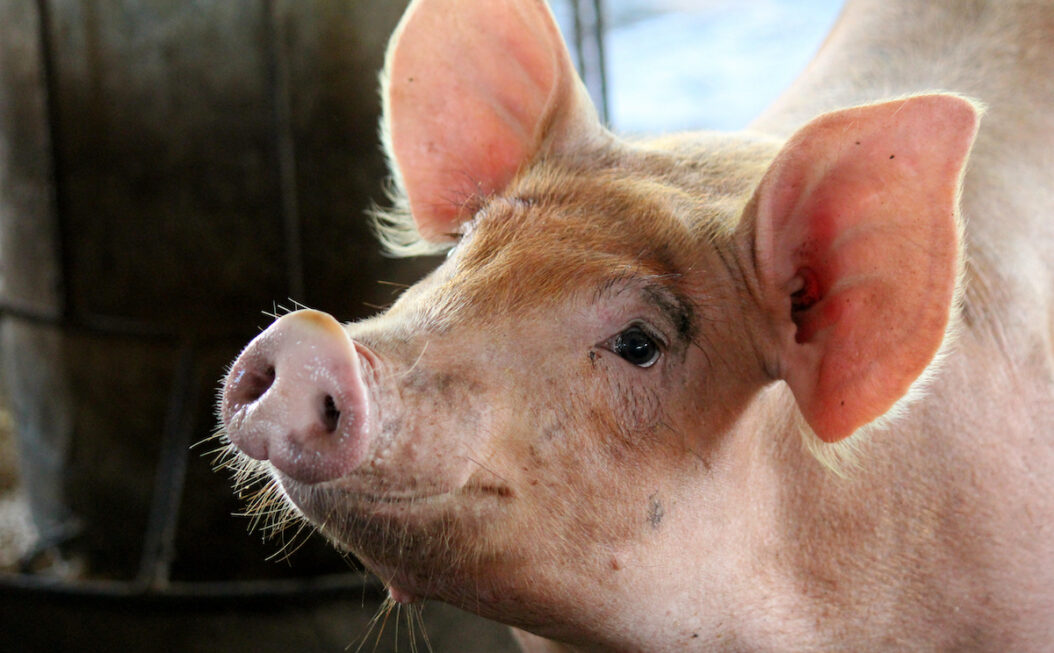
The National Pork Producers Attack on American Elections
The EATS Act could deliver China’s high-rise factory farms to our homeland.
- Wayne Pacelle
For the animal advocate who is revolutionary at heart, there’s something inspiring about the farm-animal rebellion staged at Manor Farm in “Animal Farm” (1945). Like most revolutions though, whether fictional or historical, the effort collapses due to the vanities and ambitions of the revolutionaries themselves.
In the George Orwell classic, still on the reading list for many a high-school English class, it was a gifted orator and propagandist named Squealer, a pig, who played an instrumental role in undermining what seemed to be, at first at least, a rebellion with hopeful prospects. A free-ranging speaker, Squealer was a master of misdirection and phony pronouncements and was an agent in the collapse of the uprising against farmer Jones.
Squealer was on my mind because not since Orwell’s anti-Stalinist allegory has there been quite so much bilge and propaganda coming out of the pig barnyard. In this case, it’s a pork-industry trade association spinning a yarn about the supposed devastating economic effects of a very non-revolutionary set of legislative ideas to advance animal welfare — the imposition of legal standards requiring that some animals raised for food get to move around and lie down, stand up, and turn around.
Anything but the voice for barnyard animals, the National Pork Producers Council is itself stirring something of a political revolution with a very bad odor. The Des Moines-based pig industry trade association is working with like-minded lawmakers to unwind U.S. elections — namely Prop 12 in California and Question 3 in Massachusetts — and claw away at the modest set of legal standards in place allowing farm animals an opportunity to, in the best sense, act like animals and in accordance with their evolutionary designs.
And as with “Animal Farm,” there’s more to the unfolding political story than what appears at face value. It’s not a simple narrative of factory farmers vs. animal welfare advocates.
This battle — the fight in Congress over the EATS Act proposed by NPPC — has a larger Old World political subtext, just as in Orwell’s fictional classic. That subtext is Xi Jinping’s China and its ambitions to remake the face of agriculture. That nation’s political autocrats have shown us the future of pig farming in China, and we’d be foolish to think that the nation’s leaders don’t want its surrogates who control a massive share of the U.S. pork industry to impose those same designs in rural America, too.
The Rise of the High-Rise for Pigs
In 2013, the Bank of China provided a $5 billion loan to The Shuanghui Group, better known as the WH Group, to buy U.S.-based Smithfield Foods. The effort by America’s biggest global rival to acquire one of America’s biggest protein producers was met with some grumbles and discomfort in political and economic circles at home, but no protest movement developed to trigger serious review from regulators or lawmakers to derail the acquisition.
Now, a decade into the deal, the China-controlled Smithfield Foods controls 26 percent of U.S. pork production — the most glaring example of foreign influence over U.S. agriculture, with Smithfield holding one in six pigs and nearly 150,000 acres of U.S. farmland.
And now comes the NPPC, the front group for Smithfield and the Brazil-owned JBS (which controls 14% of U.S. pork production), seeking to unwind U.S. laws that restrict some trade in pork that comes from sows in confinement crates so unforgiving that the animals are immobilized for years on end.
We get a glimpse of China’s vision for pig farming by seeing the farms it’s built in that Asian nation — a nation with a domestic consumption of 700 million pigs a year. The Chinese Communist Party is on a building boom, and the new farming model is the high-rise factory farm.
 A dystopian high-rise for pig signals China’s plans for U.S. animal husbandry.
A dystopian high-rise for pig signals China’s plans for U.S. animal husbandry.
In Neixiang province, there are 21 10-story and higher pig factory farms clustered together. It looks like a massive condominium complex in New York or Los Angeles that would house tens of thousands of families. Instead, there in China, pigs are jammed shoulder to shoulder on each floor, with every level of the factory farm its own farrow-to-finish operation. Not one of these pigs will ever see a ray of sunshine or feel a breeze buffeting their coarse coats or filling its nostrils.
More than any other human agricultural design, it reduces the animals to meat machines. It divorces them from nature and the living environments pigs need. It puts them up in the air but denies them even a glimpse of cloud or sky.
The building design is “Communist drab” and as workmanlike as can be. This is a dystopian vision so extreme that not even Orwell could have fathomed or, in a literary sense, constructed it.
Fighting Back in Congress and the States
Thanks to Animal Wellness Action, the Center for a Humane Economy, and other similar-minded groups, the United States is moving in a different direction than the high-rise pig factory. We are working to keep pigs on the ground, on the soil, and in spaces that, at the very least, give them some room to move.
In fact, this week, now seven years after voters approved it, Question 3 finally took effect in Massachusetts as a modest attempt to prevent farm animal cruelty and privation. As of Thursday, it’s no longer legal for a food retailer — a fast-food outlet like McDonald’s, a supermarket like Shaw’s or Wegmans, or a breakfast outlet like Dunkin’ Donuts — to sell whole pork that comes from pigs whose mothers were kept in extreme confinement pre-birthing cages on a factory farm. In California, a similar law passed in 2018, Prop 12, has gone into partial effect but should finally and fully come online in January.
Both measures have been delayed well beyond their original implementation dates by courtroom maneuverings by the NPPC and its allies. Political leaders in California and Massachusetts submitted to the demands of the pork industry to delay implementation of the ballot measures while legal challenges from the NPPC wended their way eventually to the U.S. Supreme Court.
In May, in NPPC v. Ross, the U.S. Supreme Court upheld a series of lower court rulings and said that Prop 12, and by implication Question 3, were a proper exercise of state authority. The pork producers, wrote Justice Neil Gorsuch in fashioning the majority opinion, “invite us to fashion two new and more aggressive constitutional restrictions on the ability of States to regulate goods sold within their borders. We decline that invitation. While the Constitution addresses many weighty issues, the type of pork chops California merchants may sell is not on that list.”
That loss before a conservative-dominated court gob-smacked Big Pork. But true to form, the NPPC didn’t waste a minute in switching venues. It demanded redress from Congress in the form of overturning American elections that deliver living space to animals.
Their legislative vehicle, dubbed the EATS Act, would “nullify any state or local law that places any kind of standard, regardless of its impact, on agricultural exchange, whether grounded on concerns about animal welfare, food safety, chemicals, agricultural pests, or worker safety,” concluded Scott Edwards, general counsel for the Center and Animal Wellness Action.
In a remarkable showing of opposition to the EATS Act, 171 House members, including five Republicans, last week sent a letter to the Agriculture Committee opposing the EATS Act. Reps. Earl Blumenauer, D-Ore., and Brian Fitzpatrick, R-Penn., led the letter.
This letter against the EATS Act comes on the heels of a new report issued last week by the Center and Animal Wellness Action. It reveals that a diversified pig production sector already in place can meet the modest demand created by Prop 12 in California and Question 3 in Massachusetts for more humanely raised pork. Those ballot measures are the primary targets of EATS, but the proposal sweeps more broadly and, according to a Harvard analysis, could nullify more than 1,000 state laws.
Nearly 40% of U.S. breeding sows are already in group housing systems, rather than gestation crates, and the Center’s market analysis shows that California and Massachusetts together will require just 6% of total U.S. pork production to come from facilities that allow the sows an opportunity to lie down, stand up, and turn around. The report reveals that the industry has been in transition for more than two decades since Florida banned the use of gestation crates in 2002 and that it has existing capacity to supply gestation-crate free pork in two states.
The Desperate Maneuverings of the Factory Farming Conglomerates
It’s become clear that the pork industry is now badly divided over the EATS Act. Some of the U.S.’s biggest pork producers, most notably the Pennsylvania-based Clemens Food Group, strongly oppose the EATS Act, along with thousands of family farmers who have invested in housing systems that give the animals some room to maneuver.
And if there is any doubt that the EATS Act is anti-family farmer, as well as extreme in its ruthless designs for animals, let’s keep one simple question in mind: Could a family farmer ever afford to build a 10-story high-rise factory farm costing $1 billion?
If there was ever a moment of clarity about the direction of American agriculture, this is it. Do we want the EATS Act and delivery of foreign control of U.S. agriculture? Or do we want the homegrown Prop 12 and Question 3, which seek to remind American consumers that sentient animals remain at the center of the enterprise of animal agriculture.
And can there be any doubt that China, through its surrogate corporations operating here in the United States, would wish to outsource high-rise factory farming of pigs to our country, with all of the massive waste loads, zoonotic disease threats, animal cruelty, and other externalities they spawn?
Let’s remember that in China, there are no animal welfare standards. There are no free and fair elections. There’s no tradition of civil society or non-profit advocacy and cultural attention to animal welfare.
Why would we think Chinese-controlled, U.S.-branded agricultural companies with a stake in the ground in our homeland would act one way at home and another way here in America?
Take Action: Contact your federal lawmakers and urge them to oppose the EATS Act, S. 2019 and H.R. 4417.
Dear reader: If you support substantive policy work to protect animals, please consider donating to the Center for a Humane Economy today. You can give any amount one time, or make it a monthly gift, as many of our supporters do. Thank you for helping us fight for all animals. Please go here to make your contribution.